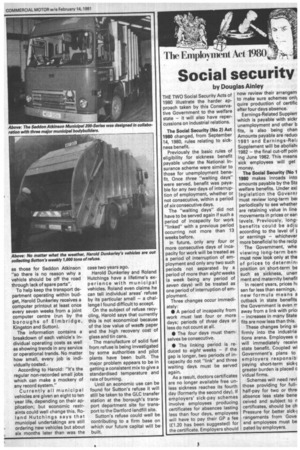Social security
Page 47

If you've noticed an error in this article please click here to report it so we can fix it.
by Douglas Ainley THE TWO Social Security Acts of 1980 illustrate the harder approach taken by this Conservative Government to the welfare state — it will also have repercussions on industrial relations.
The Social Security (No 2) Act 1980 changed, from September 14, 1980, rules relating to sickness benefit.
Previously the basic rules of eligibility for sickness benefit payable under the National Insurance scheme were similar to those for unemployment benefit. Once three "waiting days" were served, benefit was payable for any two days of interruption of employment, whether or not consecutive, within a period of six consecutive days.
The "waiting days" did not have to be served again if such a period of incapacity for work "linked" with a previous period occurring not more than 13 weeks before.
In future, only any four or more consecutive days of incapacity for work will be treated as a period of interruption of employment and only any two such periods not separated by a period of more than eight weeks (a week being any period of seven days) will be treated as one period of interruption of employment.
Three changes occur immediately:
411 A period of incapacity from work must last four or more days; periods of three days or less do not count at all.
• The four days must themselves be consecutive.
• The linking period is reduced to eight weeks — if the gap is longer, two periods of incapacity do not "link" and three waiting days must be served again.
As a result, doctors certificates are no longer available free unless sickness reaches its fourth day (formerly the second day), If employers' sick-pay schemes involve employees producing certificates for absences lasting less than four days, employees will have to pay their GP a fee (C1.20 has been suggested) for the certificate. Employers should
now review their arrangem to make sure schemes onl) quire production of certific after four days absence.
Earnings-Related Supplenwhich is payable with sickr unemployment and other b fits, is also being chan Amounts payable are reduo 1981 and Earnings-Reh Supplement will be abolish( 1982 — the final cut-off poin ing June 1982. This means sick employees will get money.
The Social Security (No 1 1980 makes inroads into amounts payable by the Ste welfare benefits. Under exi )egislation the Governr must review long-term bet periodically to see whether are retaining value in line movements in prices or ean levels. Previously, longbenefits could be adju according to the level of r or earnings — whichever more beneficial to the recip The Government, whe viewing long-term ben, must now look only at the of prices to determini position on short-term be such as sickness, unerr ment and maternity benefi1
In recent years, prices hi sen far less than earnings, new formula means a cutback in state benefits the Government is even n. away from a link with prim — increases in many State fits are now less than this.
These changes bring sit firmly into the industria tions arena. Employees o will immediately receivi state benefit. Coupled wi Government's plans to employers responsibl paying short-term sick-r greater burden is placed vidual firms.
Schemes will need revi those providing for fullhalf-pay for two or threl absence less state bene ceived and subject to n certificates, should be ch Pressure for better sick-; rangements from Gove and employees must be paled by employers.








































































































